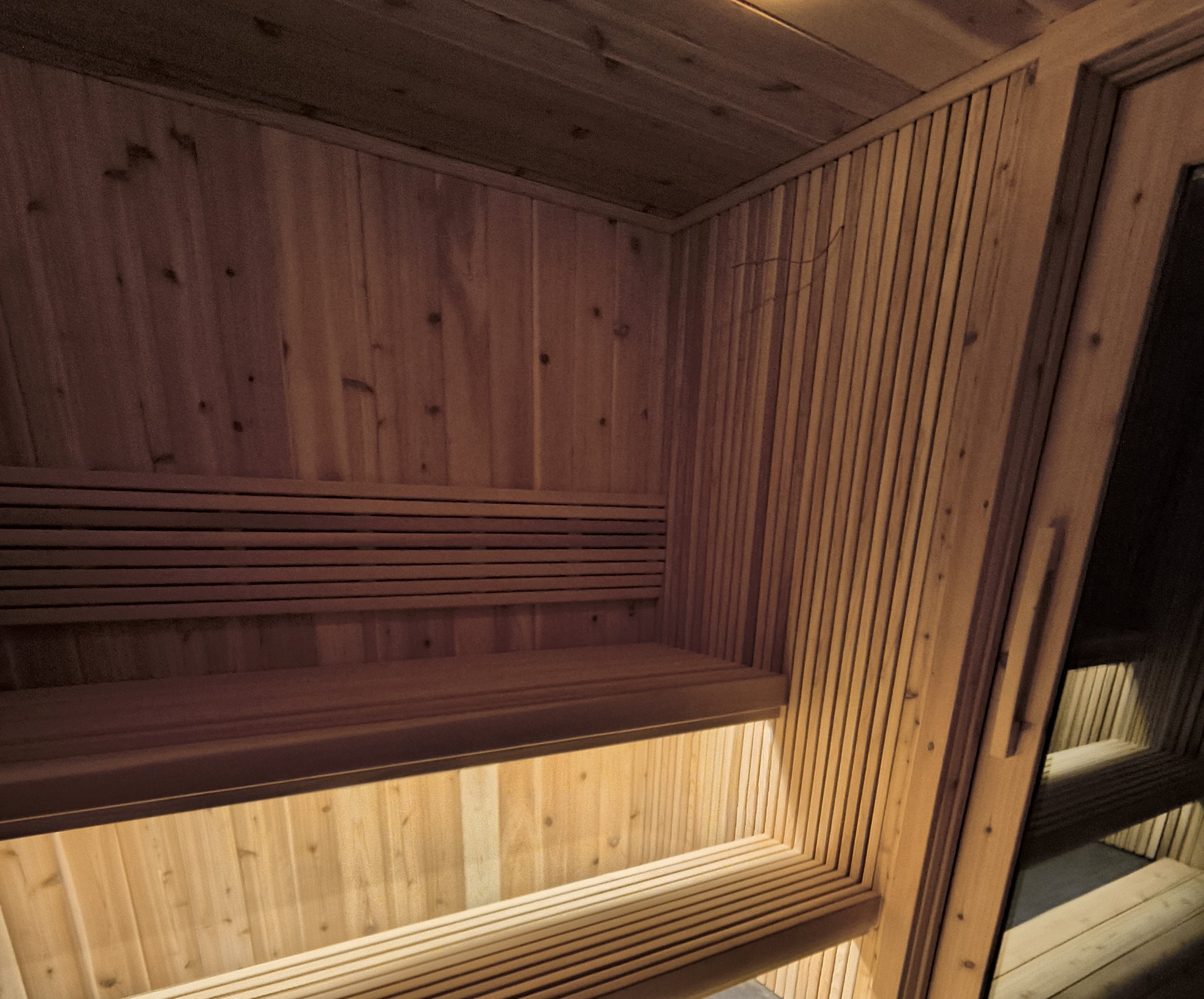
Sauna Benefits
-

Improved Heart Health
Numerous studies indicate that frequent sauna bathing may have positive effects on heart health and the cardiovascular system. This is likely attributed to the sauna's influence on various bodily systems, including cellular functioning, arterial health, and the nervous system, all of which play a role in cardiovascular well-being
-

Improved Blood Pressure
While a sauna session can temporarily raise heart rate and blood pressure, similar to the effects of exercise, there are long-term benefits for cardiovascular health. For individuals with hypertension, regular sauna use can contribute to a reduction in blood pressure levels. Additionally, for those without hypertension, frequent sauna use may lower the risk of developing high blood pressure in the future.
-

Improved Sleep
Research suggests that an increase in body temperature experienced during sauna use may contribute to the restoration of natural circadian rhythms. Many individuals report improved sleep quality following heat-related interventions, such as sauna sessions. However, further studies are needed to fully understand the impact of saunas on sleep patterns.
-

Stress Reduction
Using a sauna can lead to significant stress reduction. Research indicates that sauna sessions may lower levels of the stress hormone cortisol. Regular sauna visits into their routine might experience improvements in appetite and feelings of relaxation.
-

Breathing Improvements
Using a sauna significantly enhances lung function and breathing for nearly everyone. Many report a marked improvement in their breathing after sauna sessions, and studies confirm that their lung function improves as well. While the enhancements in lung function may be modest, the strong sense of relief and improved well-being reported by users is undeniable.
-

Recovery for Sore Muscles
The heat generated by a sauna has the ability to stimulate the release of a substance known as brain-derived neurotrophic factor (BDNF), which plays a significant role in muscle recovery and healing. Additionally, the elevated temperatures enhance blood circulation to the muscles, further aiding in the recovery process.
-

Pain Relief
If you suffer from rheumatoid arthritis or ankylosing spondylitis, studies indicate that using a sauna may alleviate pain and stiffness. “A few small studies suggest there may be relief from chronic pain,” explains Dr. Zack. “In particular, the use of dry saunas and infrared saunas is believed to boost blood circulation to muscles and reduce muscle spasms, which has been shown to ease chronic back pain.
-

Increase Longevity
Research indicates that frequent sauna use may enhance longevity and increase the health span, which is the duration of life spent in good health. Additionally, sauna bathing might boost immune function by elevating the number of white blood cells, which play a crucial role in combating infections and diseases.
-

Improves Range of Motion
Saunas could provide benefits beyond relieving sore muscles. They may assist individuals dealing with conditions that cause pain and limit movement in their muscles and joints. Individuals with fibromyalgia and chronic lower back pain report reductions in their persistent pain.es here
Using a sauna can be good for your health, but it’s not safe for everyone. If you have uncontrolled high blood pressure, diabetes, heart failure, or other health issues, talk to your doctor before using a sauna. Also, if you take medications that affect your body’s ability to regulate temperature or make you feel sleepy, you should avoid saunas.
FAQ
-
A traditional sauna typically ranges anywhere from 176°F to 212°F (80°C to 100°C). You can also add humidity by pouring water on hot rocks inside the sauna.
-
Traditional saunas have higher temperatures. Include steam. They are the basis for many of the conducted research and studies.
Infrared typically operate at lower temperatures 100-140°F. They are generally cheaper in cost.
-
When it comes to enjoying a sauna, safety is key! To get the most out of your relaxation time, aim for sessions of no more than 15 to 20 minutes. If you're new to the sauna experience, start with shorter sessions of just 5 to 10 minutes. It’s all about finding that perfect balance for your comfort and enjoyment!
-
When in a sauna, refrain from consuming alcohol, using electronic devices, wearing strong scents, and entering if you're feeling unwell. Try not to eat heavy meals right before going in.
-
Using a sauna every day can be safe, but it depends on your health and comfort level. If you are generally healthy, you can try using the sauna daily to see how it feels for you. Also, while regular use offers benefits like stress relief and muscle recovery, you don’t need to use the sauna every day to enjoy these advantages.
-
Using a sauna after a workout can be beneficial for muscle recovery and relaxation. Sauna sessions may help promote the recovery process following exercise. If you’re curious, consider incorporating a sauna visit into your post-workout routine to see how it affects your recovery. It’s important to stay hydrated before and after your sauna session.
